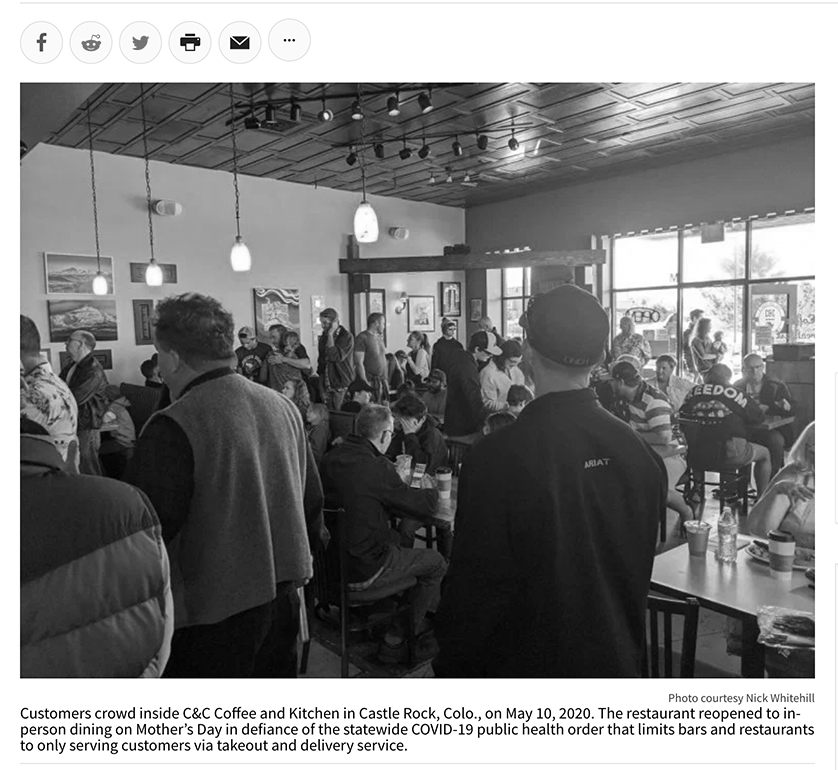
When we see photos of people crowded into a Castle Rock, Colorado, restaurant on Mother’s Day, defying not only a state order that bans in-restaurant dining, but also the common-sense behavior a pandemic demands, we are seeing how difficult it is to be comfortable with fear.
Setting aside politics – if that is possible these days when patriotism is defined by carrying a rocket launcher into a sandwich shop – those queuing up at C&C Coffee and Kitchen claim they want to get back to normal life, that they’ve suffered and given up enough.
Adverse circumstances, be they medical, financial or social, force us to abandon our routines and we become uncomfortable, anxious and fearful. We wonder when it – the disease, the recession, the social change – will end and we can return to how we were before. It was not perfect (it never is), but it was familiar, it was comfortable.
Uncertainty produces fear. Just ask any stock trader or someone awaiting the results of a biopsy. Nobody likes being afraid. No one save the admirable ilk who jump out of airplanes with chutes attached to their backs and similar risk-loving souls, willingly chooses fear over comfort. There are times, though, when fear is the only wise choice. This is one of them. Fear keeps us apart, so we don’t infect one another or our families. Fear makes us respect the social guidelines because unless we do the pandemic will persist, and normalcy will be further postponed. Fear teaches us to avoid doing what is dangerous (don’t touch the hot stove; don’t be around someone who is coughing.)
Fear is exhausting, though. It wears you down. To withstand it, whether it’s for a few seconds before you point the kayak into the whitewater or for several months while giving up haircuts, cappuccinos and a suntan, requires two things: discipline and a leap of faith.
The first is obvious: Being afraid is not easy. It’s not for sissies (as my mother, God love her, uses to say about getting older). Living with fear does not demand the iron discipline of a Seal Team member (although if you’ve got that, go with it), but more of the slushy stubbornness of the guy who runs a marathon and comes in last. It ain’t pretty, but it works, and it gets you to the finish line.
Most Americans suck at discipline or even at being stubborn. That want what they want an they want it now – one-hour delivery, Instapot, medical miracles, the right to carry weapons of war while ordering a Chicken & Bacon Ranch Melt at Subway. As a nation, we are fat (42 percent prevalence of obesity), illiterate (27 percent haven’t a book in the past year), and stupefied (nearly one in four adults struggle with substance use – booze or drugs). This is not the army I want to go to war with. No wonder that eight weeks into a pandemic that has infected more than 1 million of Americans and killed 80,000 – with tens of thousands more to come – so many Americans have battle fatigue.
The fear, the fear of never being “normal” again, is winning.
Even more than discipline (iron or slushy), fighting fear requires a leap of faith. It amazes me that so many conservatives who root their political leanings in the parables of the bible seem incapable of applying the faith they have in an ephemeral kingdom located on the far side of universe populated by toga-wearing men with wings to the idea that fighting fear requires us to believe we will succeed.
The skier tips her toes over the cornice believing she will arrive at the bottom of the run in one piece. The skydiver steps into the air believing the chute will open. The young couple in love marry believing their lives will be long and peaceful. The writer fills the page believing the book will come. On and on and on. All of human life and endeavor, from the quotidian to the audacious, depends on overcoming uncertainty, in believing in a favorable outcome.
Yet, here we are, in a nation infected by two diseases: a microbial invader that propagates by our carelessness, and an intolerance of uncertainty, discomfort and inconvenience nourished and encouraged by the most childly selfish man to ever occupy the Oval Office. Ironically, a good portion of the American population is more afraid of the latter than the former. Fear doesn’t kill you. Covid-19 does.
We all know FDR’s line, delivered in 1933 in his first inaugural speech and addressed to a nation that was four years – not eight weeks! – into a depression that was devastating not just families but entire regions of the county. “Let me assert my firm belief that the only thing we have to fear is fear itself,” he said – and that is the most quoted line, but he continued: “—nameless, unreasoning, unjustified terror which paralyzes needed efforts to convert retreat into advance.”
These words remind us that the battle against fear requires one more thing beyond discipline and faith – leadership.
“In every dark hour of our national life,” Roosevelt said, “a leadership of frankness and vigor has met with that understanding and support of the people themselves which is essential to victory. I am convinced that you will again give that support to leadership in these critical days.”
Absent that leadership – and, sadly, the nation is – we, we the people, need to hold our ground, dig in, have faith in ourselves and get comfortable with the fear. Don’t run. Stare it down. Laugh at it. When confronted, fear loses potency. It retreats. You want your normal life back, then first get control of your fear. Don’t give it the power to make you stupid, to do things that could kill you or your family. That’s something that should really scare you.
